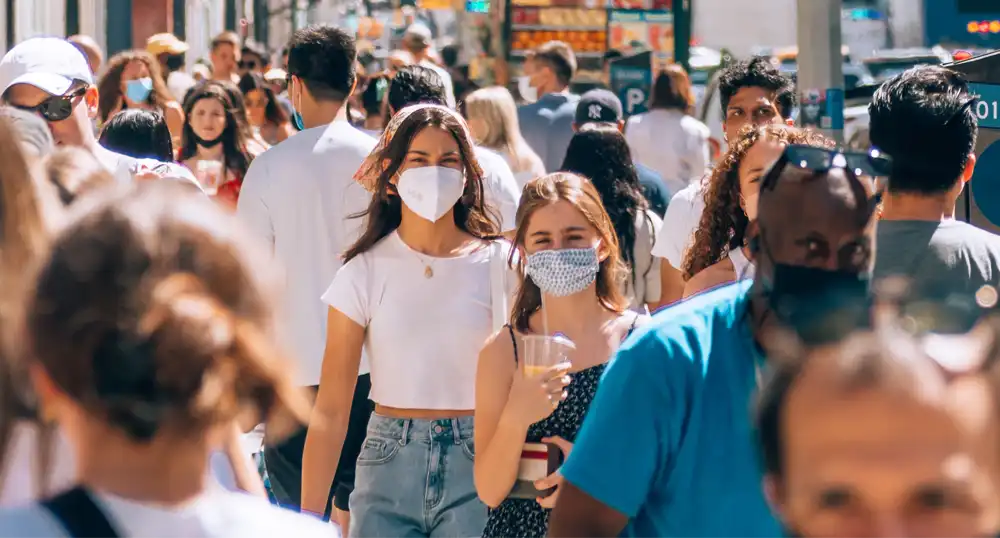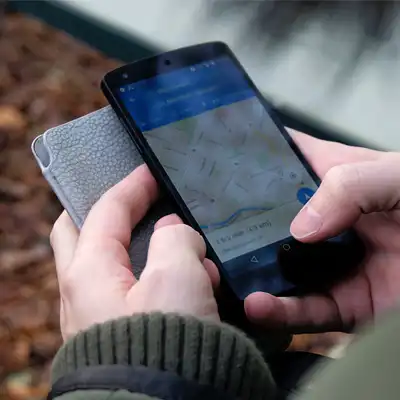How to Travel Safely in Uncertain Times
Travel Team | Jun 12, 2023

It’s common — and normal — to be concerned about safe travel, especially when venturing abroad. Between COVID-19, terrorist attacks, natural disasters, and all the other news that dominates our phones and televisions, it only increases existing anxiety.
Fear of the unknown is always difficult. Fortunately, even though you can’t predict when or if a catastrophic event will occur, you can still take steps to prepare yourself for a worst-case scenario.
Is It Safe to Travel?
Even with lots happening in the world, people aren’t letting their fears keep them from traveling. The recent trend of “revenge travel” proves that we’re ready and willing to get back out there despite the risk.
The key is to take the proper precautions so that when you do explore, you can do so safely and with confidence. Follow the appropriate hygiene and health recommendations to limit your risk of illness and injury. Research your destination to find out about the potential for civil unrest or natural disasters.
If the risk feels too high for you, it might be best to put that location on your bucket list for another time. But that doesn’t mean you have to stay home. Keep searching and you’re sure to find somewhere just as fulfilling.
How to Travel Safely
When you’re traveling, there’s no way to know if a terrorist event or outbreak of illness will happen, but you can take a few steps to prepare for one.
1. When you plan your trip, pay attention to news about your destination.

What’s happened in the past few months? Is there an upcoming event that could make travel to that area potentially dangerous?
One way to stay on top of this is to enroll in the United States Department of State’s Smart Traveler Enrollment Program (STEP). Setting up an account is easy and free. After you register your trip on the site, you’ll receive travel alerts and warnings from the Department of State.
It also provides three other key benefits:
- You receive important safety notices from the embassy in your destination country.
- It helps the U.S. Embassy contact you for many types of emergencies (natural disaster, civil unrest, family emergency).
- Family and friends can use STEP to contact you in an emergency.
You’ll need your passport handy to answer questions about your passport number, date of issue, and expiration. Also, you’ll have the option to provide emergency contacts. This should always be a trusted person who is not traveling with you.
Be sure to check out the Centers for Disease Control (CDC) Travelers’ Health site, too. There’s tons of valuable information about staying healthy during your trip. You can also select your destination, and the CDC will give you a list of alerts, vaccines, and preventive health steps to take for that country.
2. Share your itinerary with friends and family who aren’t traveling with you.
You may not be able to predict your whereabouts every minute of the day (nor may you want to), and that’s OK. Still, it’s best to have at least an idea of where you’ll be and when in case of emergencies.
Share this information with trusted people back home, so if they see on the news that there was an earthquake, they’ll know if you are in harm’s way. That knowledge can give them peace of mind and, if necessary, spur them to action to arrange help for you.
Once you’ve shared your itinerary, arrange designated times to check in with those friends and family at home. This is especially important if you’re traveling solo. Plan to call, text, or email periodically just so you can let them know you’re doing well and having a great time.
If you’re traveling with others who are venturing out on their own, establish designated check-in times with them as well.
3. Get the best travel apps.

Life360 allows you to see exactly where each member of your travel group is on a map, along with their current address. You can also send messages or a help alert to your circle of connected members.
If you aren’t sure about your phone’s international service, try WhatsApp. This app lets you text, call, and video chat over Wi-Fi and is a great way to stay in touch overseas. You can even use WhatsApp to contact Seven Corners if you need travel assistance.
Cloud-based apps for storing travel documents — identification cards, insurance cards, passport information — are also great if you get in a jam. Having access to digital copies of this information can be extremely helpful if you get pickpocketed or lose your documents.
4. Before departure, familiarize yourself with your destination.
This goes beyond where you’re going to stay and which local foods to try.
- Research which neighborhoods might be less safe so you know where to avoid, especially after dark.
- Gain a basic understanding of local customs and laws. The last thing you want is to find yourself in an uncomfortable or unsafe position simply because you didn’t know you were supposed to take your shoes off before entering a temple or that you shouldn’t touch someone of the other gender, even just for a handshake.
- Know how to contact emergency personnel — in Europe, you dial 112 for a general emergency — and what to do if you get sick while traveling.
- Learn how to contact help for situations that aren’t actually emergencies but where you could use some extra support. When you purchase Seven Corners travel insurance, for example, you’ll get travel assistance services as part of your non-insurance benefits. Our Assist Team can help you navigate situations like how to contact an embassy or what you need to do to replace a passport.
- If you’re going to be in one place for a while, like you might if you’re trying out the digital nomad lifestyle, figure out where nearby hospitals are.
5. Consider purchasing trip insurance.
Travel insurance protects your money by reimbursing you for prepaid, nonrefundable trip costs if you have to cancel, interrupt, or delay your trip for covered reasons. It can also pay for medical expenses if you get sick or hurt while traveling. All of these things can be extremely helpful when you’re traveling during uncertain times.
Plans vary, so you can find the right protection for you and your trip, even if your situation is unique. Because of those differences, do your research and read your plan documents carefully so you understand exactly what is covered.
Here are some benefits to look for when choosing the right travel insurance for your trip.
Coverage if you need to cancel your trip
Most travelers want to know if you can cancel your trip and get your money back if you’re scheduled to visit a location when a terrorist incident or uptick in COVID cases occurs. Or, maybe you’ve simply become more fearful about traveling because of recent events and want to cancel or interrupt your trip.
Most trip insurance plans have some type of coverage for a terrorist incident, provided the act of terrorism occurs in your destination city within a certain number of days of your scheduled arrival.
Normally, in order for a terrorist event to be covered, the U.S. Government must declare the incident is an act of terrorism. You must buy the plan before the event meets the definition a terrorist incident. Why? Because at that point, it’s what we call a known peril. You can’t buy car insurance once your car has been wrecked; you must have the coverage in place before that happens.
What if you want to cancel your trip for any type of scary event and get your nonrefundable trip cost back? You need to add the optional Cancel for any Reason (CFAR) benefit to your plan. With this, you can cancel your trip for literally any reason, including fear of travel or simply changing your mind about taking your trip.
While CFAR lets you cancel your trip for any reason and still receive a reimbursement of 75% of your nonrefundable trip deposits, there are a few requirements for purchasing it. You must buy the CFAR benefit within a specified timeframe, usually 20 days, of making your first trip deposit/payments. If you add additional travel arrangements to your itinerary later, you must also buy coverage for those prepaid, nonrefundable expenses within 15 days of subsequent deposits.
Additionally, you must cancel the trip at least two days before your scheduled departure in order to be reimbursed.
Coverage if you need to interrupt your trip
Sometimes a situation gets worse after you’ve left home and you decide to end your trip early. To be reimbursed for the unused portions of your prepaid, nonrefundable trip expenses, you need trip interruption coverage. Like trip cancellation, these benefits only apply if you interrupt your trip for a covered reason as listed in your plan document.
To have the flexibility to interrupt your trip beyond the covered reasons, consider adding the optional Interruption for Any Reason (IFAR) benefit. With this coverage, you can return home early or move along to your next destination ahead of schedule for any reason you wish without forfeiting all of your prepaid, nonrefundable expenses (IFAR reimburses you for 75% of those expenses). IFAR is especially helpful if you arrive at a destination that feels unsafe and you change your mind about remaining there.
Like CFAR, you must purchase IFAR within 20 days of your initial trip deposit and within 15 days of paying for subsequent travel arrangements.
Coverage for quarantine
We all became familiar with quarantining during the COVID pandemic, but that isn’t the only illness that might require you to isolate and not be able to travel. Measles and yellow fever, for example, can require quarantining. Travel insurance can help if your trip is disrupted because of that.
Look for trip delay coverage that will help with expenses related to your quarantine. This can include paying for additional food, lodging, and transportation if you have to alter your travel arrangements when you’re required by a physician to quarantine.
Coverage if you are hurt in a terrorist event
Trip insurance plans typically cover medical expenses due to an accidental injury occurring during your trip, so if you were hurt in a terrorist attack, it would be covered. There are additional requirements for these types of claims (such as not being involved in the terrorist event), so be sure to review your plan document before your trip to understand those restrictions and exclusions.
It’s important to note that war is listed as a general exclusion for most plans on the market. That means we will not pay for any loss or expense caused, due to, arising or resulting from war or act of war, including invasion, acts of foreign enemies, hostilities between nations (whether declared or undeclared), or civil war. Be sure to read the plan document to fully understand what is covered as well as exclusions and limitations.
Travel assistance services
Travel assistance from Seven Corners is a non-insurance benefit included with all of our plans. If you run into a travel emergency, and you’re not certain what to do, give the Seven Corners Assist Team a call, chat with them via our website or WhatsApp, or send an email. This multilingual team is available 24/7.
Travel Insurance for Peace of Mind
There’s a lot to consider for a trip in the best of times, but if you’re an anxious traveler, we understand that it can feel even more overwhelming. Let Seven Corners help you find protection to put your mind at ease. Talk to one of our licensed agents or get a quick quote online.
Search Posts
Receive our monthly inspiration and travel tips from the travel insurance experts.
Sign me upThis website and various social media updates provided by Seven Corners contain content, information, articles, videos, and links to websites created by third parties. Seven Corners, its owners, and its employees neither endorse nor are responsible for the accuracy, timeliness, or reliability of any third-party information, statements, opinions, or advice and are not liable for any loss, harm, or damage caused by your reliance upon them. Use of such information or the linked websites is entirely at your risk. Concerns regarding this third-party content should be directed to the third party. Seek professional advice, as appropriate, regarding your use of such information and websites.
Because the information on this website and in Seven Corners’ blogs and other social media is written and compiled using knowledge and information available at a certain point in time, it may become outdated. For that reason, information, events, legal requirements, and product changes (including benefits, limitations, exclusions, and services) may not be up-to-date, complete, or accurate at the point in time it is being read. Again, use of such information is at your risk.
